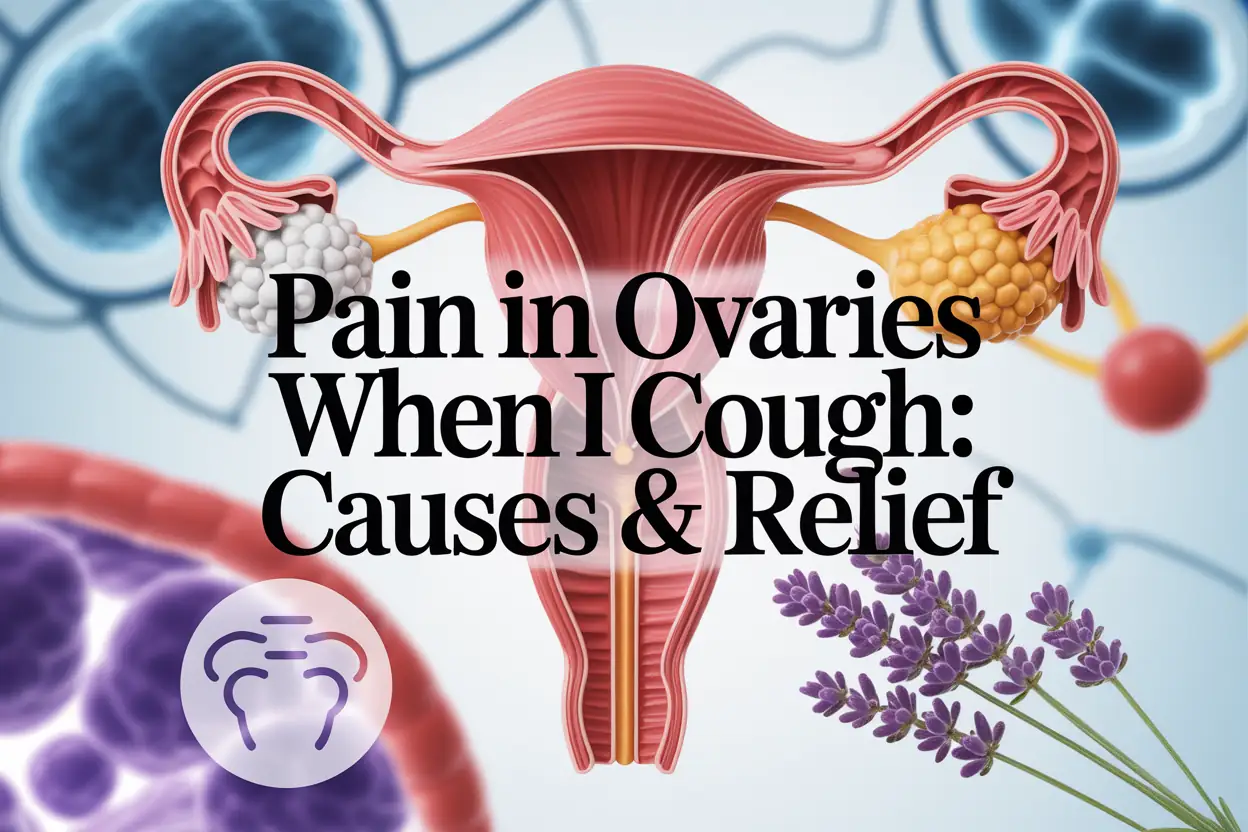So, here’s something odd I noticed a while back… every time I coughed, I’d get this weird little jolt of pain low in my abdomen. Like, near where my ovaries are. At first, I brushed it off. Maybe it was just a muscle spasm or some random cramp.
But Pain in Ovaries When I Cough kept happening. Not always, not every single time, but enough that I started paying attention. And if you’re here, reading this, maybe you’ve felt it too.
Coughing should be simple, right? Just a reflex. But when there’s pain involved, especially in a sensitive area like your pelvis, it makes you wonder what’s actually going on underneath it all.
Also Read: How Gastric Sleeve Surgery Ruined My Life – Here’s Proof
What Could Be Causing This Pain in Ovaries When I Cough?

Okay, first things first. That twinge or sharp pain when you cough might not be directly from the ovaries. The pelvis is… complicated. It’s home to a whole network of organs and tissues—your bladder, uterus, fallopian tubes, intestines, pelvic floor muscles, and of course, your ovaries. So pain there can be coming from a number of places.
1. Ovarian Cysts
One common culprit? Ovarian cysts. They’re usually harmless—a fluid-filled sac that forms during your menstrual cycle. Many just go away on their own. But some stick around or grow larger, causing pain when pressure shifts, like when you cough or sneeze.
Some cysts can twist or rupture. That’s when it gets serious… like severe pain, sudden sharp cramps, even nausea or vomiting. If the pain hits hard and fast, it might be time to get it checked.
2. Pelvic Floor Muscle Strain
This one’s sneakier. Your pelvic floor muscles support everything in your lower abdomen. If they’re tense, weak, or overworked—say from heavy lifting, chronic coughing, or just not doing enough pelvic floor exercises—that can lead to pain. Especially when that pressure builds suddenly, like with a cough.
I remember one time I moved a ridiculously heavy box without thinking. Two days later, I coughed and got this sharp pull near my lower abdomen. It clicked that I had overstrained something. Stretching and physical therapy really helped, though it took time.
3. Endometriosis
If you’re someone who deals with painful periods or has experienced discomfort during sex or bowel movements… there’s a chance endometriosis might be involved. It happens when endometrial tissue (the kind that normally lines your uterus) grows outside of it. On your ovaries, fallopian tubes, or even in your abdominal cavity.
Coughing can shift things just enough to trigger that extra sensitivity. It’s not always easy to diagnose. Often, it takes imaging tests, physical exams, or even a minor surgical procedure to know for sure.
Also Read: 10 Simple Steps to Establishing a Receptive Mind-Set for Personal Growth
4. Ovarian Torsion
This one’s rare, but serious. Ovarian torsion means the ovary twists around the ligaments that hold it in place, cutting off its blood supply. The result? Intense, sudden pain that might flare up with movement—like coughing.
It usually requires emergency medical care. Other symptoms could include nausea, vomiting, and sometimes a fever. If you ever feel that kind of pain, don’t wait it out.
5. Urinary Tract Infections (UTIs)
Not all pain near the ovaries is gynecological. UTIs, especially if they move up toward the kidneys or affect the bladder, can radiate pain throughout the pelvic area. You might also notice burning during urination, frequent urges to go, or even blood in your urine.
UTIs are super common, but they shouldn’t be ignored. They can lead to more serious kidney infections if left untreated.
6. Pelvic Inflammatory Disease (PID)
This is an infection of the reproductive organs, often caused by untreated STIs. It can cause pelvic pain that worsens with pressure—like coughing, sex, or even physical activity.
If you’re also experiencing unusual vaginal discharge, fever, or painful urination, it’s worth bringing up with a healthcare professional.
Also Read: Ten Worst Foods for Prostate Health to Cut Out Today
Other Potential Causes to Consider
Sometimes, the pain could be linked to:
- Abdominal muscle strain or improper lifting techniques
- Gastrointestinal issues like gas or irritable bowel syndrome
- Hernias or pelvic organ prolapse, which can create weak spots in your abdominal wall
- Chronic conditions like pelvic pain syndrome or musculoskeletal issues
And in rare cases, something like ectopic pregnancy or a ruptured cyst could be the cause—both of which are medical emergencies.
The Role of Intra-Abdominal Pressure
Here’s something people don’t talk about much: coughing creates pressure inside your abdomen. It’s called intra-abdominal pressure. If there’s a weak spot, injury, or inflammation in that area—whether in your ovaries, pelvic muscles, or nearby connective tissue—that pressure can push against it and trigger pain.
So even if your cough is unrelated, the motion itself becomes the trigger.
Getting an Accurate Diagnosis
This part isn’t fun, I know. But if you’re experiencing persistent or worsening pain, the only way to really understand what’s going on is through a proper diagnosis. That might include:
- A physical examination
- Blood tests and urine tests
- Imaging techniques like ultrasound or magnetic resonance imaging (MRI)
- A full review of your medical history
- Sometimes laparoscopic procedures
It sounds like a lot, and maybe it is. But getting answers matters. Especially when it’s about your quality of life.
Relief & Treatment Options
Okay, so let’s talk about some relief. Depending on what’s causing the pain, treatment can vary quite a bit. But here are a few general strategies:
Conservative Measures
- Rest. Especially if the pain is tied to overuse or muscle strain.
- Heating pad for abdominal discomfort
- Gentle pelvic floor exercises or stretching
- Over-the-counter pain medications like ibuprofen
- Wearing a support brace during activity (can help with muscle tension)
Medical Interventions
- Hormonal therapies or birth control pills to regulate ovarian activity
- Antibiotics for infections like UTIs or PID
- Physical therapy or manual therapy for pelvic floor dysfunction
- Surgical options for things like ovarian torsion, large cysts, or endometriosis
Lifestyle Adjustments
- Stress management techniques and relaxation techniques (deep breathing can actually help more than you’d think)
- Maintaining a healthy weight to reduce pressure on abdominal and pelvic structures
- Proper lifting techniques (seriously—this matters)
- Staying hydrated and following a fiber-rich diet to avoid gastrointestinal issues
Complementary Therapies
- Kegel exercises to strengthen pelvic muscles
- Muscle relaxants or nerve pain medications in some chronic cases
- Floor physical therapy, especially guided by a physical therapist familiar with pelvic pain
- Massage, acupuncture, or even yoga if that fits your lifestyle
Sometimes, it’s not about finding one magic fix. It’s about layering multiple small things that, together, ease the pain and help you feel more in control of your body again.
Also Read: Top 10 Effective Time Management for Fitness Enthusiasts
When to Seek Help
If any of these things happen, don’t wait:
- Sudden, severe pain
- Pain accompanied by fever or chills
- Vaginal bleeding not related to your period
- Fainting, dizziness, or shortness of breath
- Pain that doesn’t go away, or gets worse with time
- Blood in urine or during a bowel movement
Sometimes it’s easy to shrug off discomfort, especially if it comes and goes. But if something feels off, that’s reason enough.
Final Thoughts
That pain in your ovaries when you cough… it’s not nothing. Maybe it’s minor, maybe it’s a sign of something that needs a closer look. Either way, your body’s trying to get your attention.
You don’t have to panic. But you do deserve answers—and comfort, and the ability to move through your day without wincing from a simple cough.
Talk to a medical professional. Ask the uncomfortable questions. Get the scans or tests, even if they feel like overkill. It’s your health. And pain—even small, weird, occasional pain—deserves care.
Frequently Asked Questions
1. Is it normal to feel pain in your ovaries when you cough?
Not exactly normal, but not unheard of either. It depends on the cause—sometimes it’s just muscle strain, other times it’s more complex.
2. Could ovarian cysts cause pain when I cough?
Yes. Especially if they’re large or pressing on other structures. Even a simple movement can irritate the area.
3. What does ovarian torsion feel like?
It’s usually sudden, severe, and sharp. It may also come with nausea, and it’s a medical emergency.
4. Can a UTI cause pelvic pain when coughing?
It can, particularly if the infection has spread or if the bladder is inflamed. Look for other symptoms like burning during urination.
5. Should I see a doctor if the pain isn’t that bad?
Even mild, consistent pain is worth checking out. It might be nothing serious—or it might be the start of something that needs care.
6. What if the pain only happens during my period?
That could point toward endometriosis or something related to your menstrual cycle. It’s worth discussing with your provider.
7. Are there home remedies that help with ovary pain?
Heating pads, rest, gentle movement, hydration, and anti-inflammatory meds like ibuprofen can all help. But don’t rely on home remedies alone if pain persists.
8. Can coughing aggravate pelvic floor problems?
Absolutely. Coughing increases intra-abdominal pressure, which can stress weak or tight pelvic floor muscles.
9. Do I need an ultrasound if the pain keeps coming back?
Yes, usually that’s one of the first steps in identifying cysts or other structural causes.
10. Is this pain something that goes away on its own?
Sometimes. If it’s due to strain or a minor issue, it might resolve. But if it’s tied to a medical condition, you’ll need proper treatment to find lasting relief.



